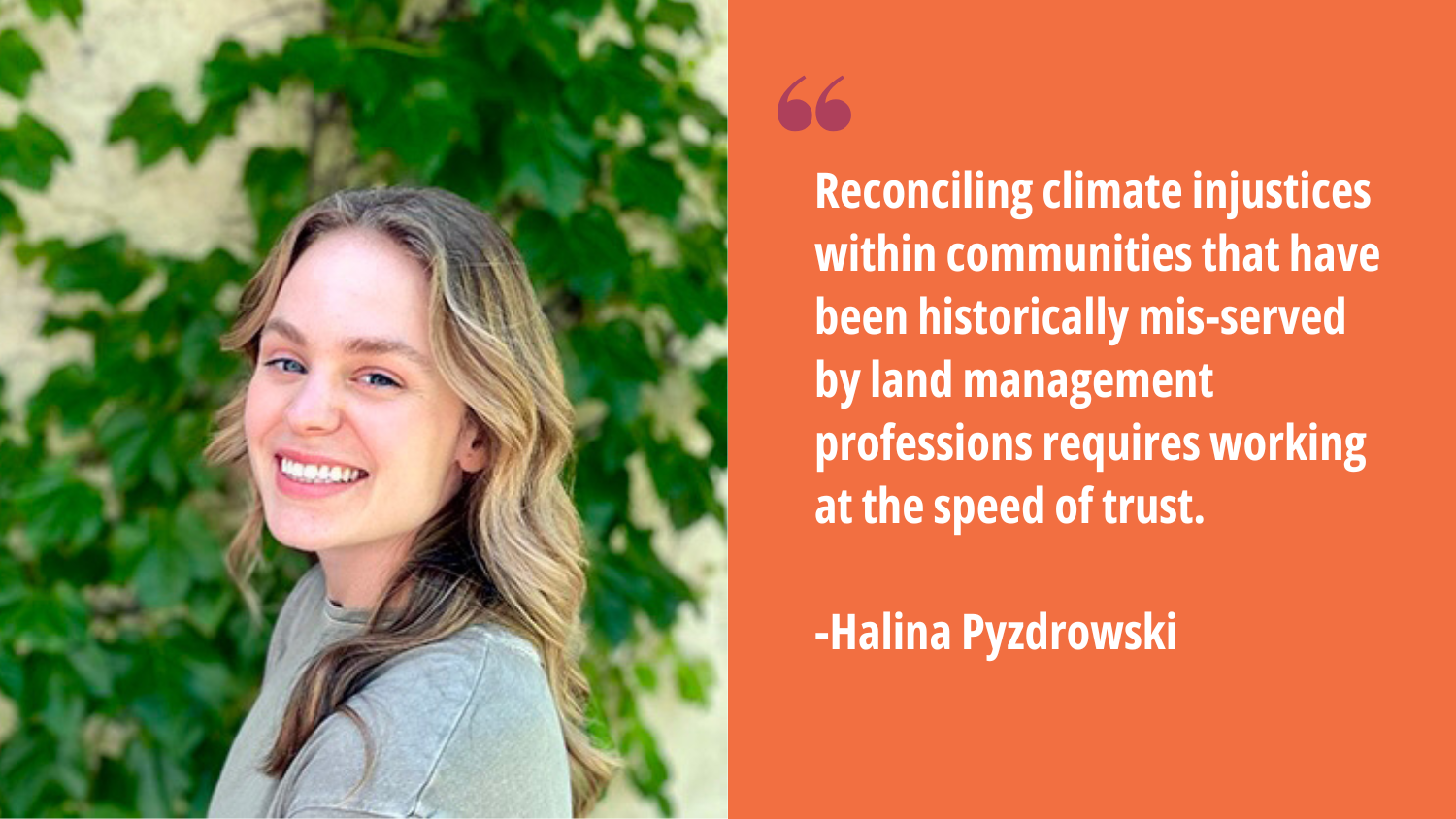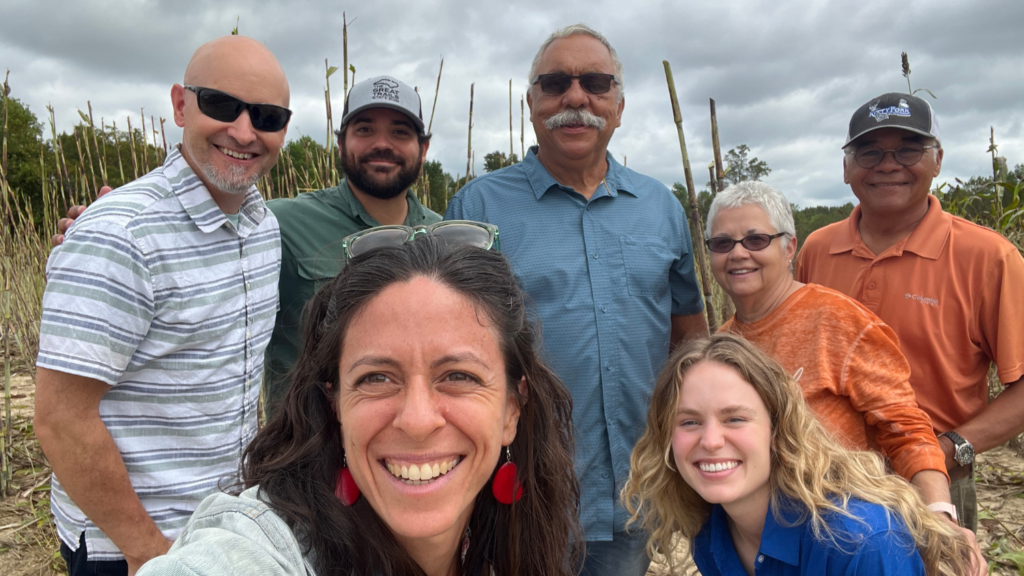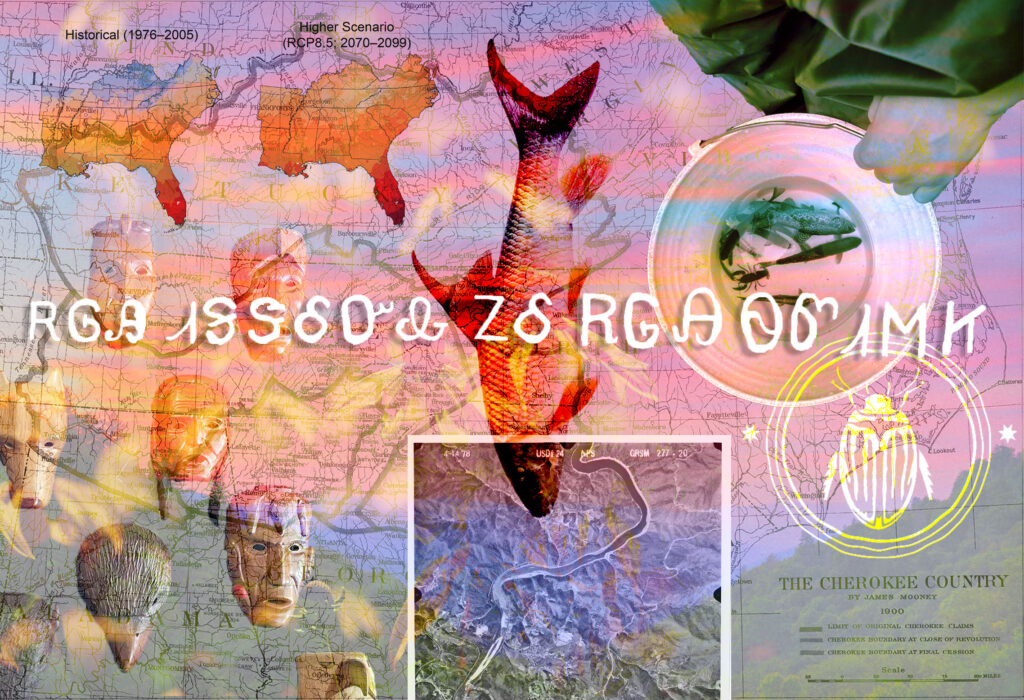Researcher Spotlight – Halina Pyzdrowski

2024-25 Global Change Research Fellow
MLA Student, Department of Landscape Architecture and Environmental Planning
Advisor: Andrew Fox
About You
What do you study?
I study the social, emotional, and economic impact of climate change on small, rural, and/or under-resourced communities. My scholarship seeks to help these communities become more resilient to flooding through co-design processes.
I am currently collaborating with the Coastal Dynamics Design Lab and the Coharie Tribe in Sampson County, North Carolina. Using geospatial tools, I am identifying locations for agricultural conservation practices–such as constructed wetlands and riparian buffers–to improve water quality and strengthen flood resilience. In conjunction with participatory engagement sessions with the Coharie People, our work will build capacity for the tribe to become the facilitators of watershed management in the county, while enhancing culturally significant fishing habitat and river access.
What (or who) influenced you to go into this field of study?
Having grown up in a suburban area of the Upper Midwest, I was largely shielded from the impacts of climate change for most of my life. It was not until I moved to a small town situated next to a river, that I began to see the complex interdependency of natural forces and the built environment. In less than a decade, our small community witnessed two 100-year flooding events. For a community whose rural livelihoods largely depended upon the health of the landscape, the economic and emotional impact was devastating. In sharing moments of grief and frustration, I realized that the design of our public spaces fundamentally affected how people perceived the land, their neighbors, and themselves. My desire to study and work in landscape architecture is deeply rooted in positively influencing these perceptions in the direction of resilient and equitable communities.
What do you think is the most pressing issue related to global change?
Reconciling climate injustices within communities that have been historically mis-served by land management professions requires working at the speed of trust. And yet, the rate of global change implores urgent action. As land managers, we bear a professional responsibility to reconcile prior misdeeds with research, tools for adaptation, and relationships in order to protect the cultural heritage and local knowledge that these individuals possess.
About Your Research

What results are you finding?
The most important thing I have learned is to let communities lead. There are many sources for knowledge, each with their own validity. Often when these forms of knowledge converge, we find the best solutions. I am constantly reminded to be humble, and in the words of a favorite poet, to never hurry through the world and bow often.
Who will benefit from your research?
My research is relational. Primarily, my work seeks to benefit communities as they build their internal capacity for climate adaptation. In turn, I get to know a community and their place deeply. Finding solutions that are born from that exchange is tremendously meaningful.
How would you describe your research to a 3rd grader?
Imagine you and your friends are building a big, strong sandcastle with lots of tools—buckets, shovels, and many hands helping. When the waves come, it holds up well, and if it’s damaged, you can rebuild it quickly.
One day, a friend decides they want to tear down some of your towers, so that they can build a moat to protect their own. They claim it will be better for the castle as a whole. The others agree, and you’re told to move your castle closer to the water. With fewer tools and helpers, the wind and waves keep knocking it down, and you can’t make it as strong as the first one.
In my research, I help people that have faced many challenges, like that second sandcastle. Together, we figure out how to protect their communities from flooding and help them rebuild stronger and faster.
About Your Global Change Research Fellow Experience
How do you expect the SE CASC Global Change Research Fellows Program to impact you and your work?
The SE CASC Global Change Research Fellows Program will enable me to develop more-robust climate literacy and form key relationships within potential partners. The program will greatly support my professional goals of creating community-driven, climate-adaptive design solutions that improve resiliency across landscapes.
What advice would you give to a student that is interested in getting involved in your field?
There is a place for designers in solving the world’s most complex problems! The value of landscape architecture to climate science is inherently linked to the discipline’s proficiency in navigating between topical, temporal, and spatial scales. Find people and projects that inspire you–particularly those outside of your field–and ask how you might begin to blur those lines. Most importantly, share your ideas– you never know where they might lead.
What has been the most rewarding part or your favorite part of being a SE CASC Global Change Research Fellow?
My favorite part of being a SE CASC Global Change Research Fellow is developing long-lasting relationships with people I would otherwise not have the chance to meet. That goes for my GCRF cohort, SE CASC staff, and natural resource manager network, as well as the communities in which I do my research.

Tell us about the science communications project you put together during the field intensive
My science communication project graphically considers the value of different ways-of-knowing. During the GCRF Field Intensive, we met with members of the Eastern Band of Cherokee, National Parks Service wildlife biologists, and climate scientists. From each type of knowledge, we learned something fundamental about the local landscape; as a result, our understanding grew to be greater than the sum of its parts.
Learn more about the Southeast Climate Adaptation Science Center’s Global Change Research Fellows program.
- Categories:
